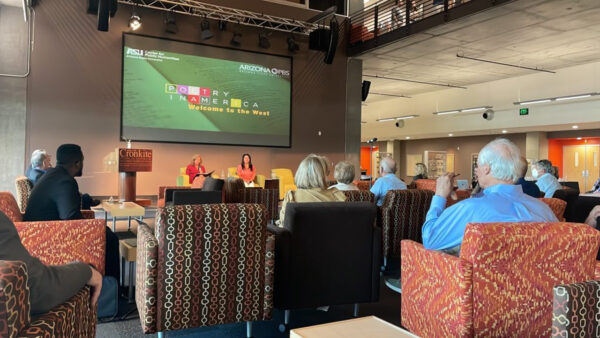POV “Mugabe and the White African”
July 26, 2011
-One White Family Defies Terrifying Odds to Keep Their Farm in Zimbabwe-
The Campbell family of Zimbabwe — Mike Campbell, his wife, Angela, their daughter, Laura, and their son-in-law, Ben Freeth — may have been white people determined to hold on to their farm, but they were not in the mold of colonialists hanging on to land extorted from blacks. They were among the native-born whites who did not flee in 1980 when Zimbabwe, the former Rhodesia, achieved full independence and black majority rule. Embracing the new country, Mike and Angela expanded their small farm that same year, buying additional land to create a game preserve, with the full approval of the newly elected government led by independence fighter Robert Mugabe and his Zimbabwe African National Union–Patriotic Front (ZANU-PF) party.
Twenty years later, the Campbells found themselves in the crosshairs of a brutal land redistribution program enacted by the same Robert Mugabe. Lucy Bailey and Andrew Thompson’s Mugabe and the White African is an inspiring and chilling account of the Campbells’ efforts to fight the government. Mugabe and the White African airs Tuesday, July 26, 2011 at 10 p.m. on Eight.
Filmed over 12 months in 2008 by the UK-based Bailey and Thompson, who often worked clandestinely under risk of arrest, Mugabe and the White African discovers a family of remarkable courage, one that stands up to violent intimidation and dares to take a despot to an international court. The secretly shot footage in the film also shows the violent methods that despot used. On April 6, 2011, Mike Campbell, age 79, paid the full price of his courage: He died in Harare, Zimbabwe from the brutal beating he received on June 2, 2008, as recounted in this film.
It is widely recognized that land redistribution is a ticking time bomb in Zimbabwe and neighboring South Africa, where native-born whites continued to own most of the land even after the arrival of black-majority rule. To avoid violence and keep their skilled white populations, many of whom, like the Campbells, identified as white Africans, governments in both nations adopted cautious approaches to land redistribution. In South Africa, such caution has so far succeeded in averting violent civil conflict. But in Zimbabwe, by 2000, something had gone seriously amiss.
That was the year armed gangs of supposedly landless former independence fighters, urged on by Mugabe, who had “cancelled” all title deeds and declared all land to belong to the government, began invading white-owned farms. The gangs squatted on the land, threatened and beat owners and workers and, if all else failed, burned the farms to the ground, killing those who got in their way. The land invasions were soon exposed and widely condemned as a cynical land grab meant to entrench Mugabe’s power while lining the pockets of the ruling circle. Adding insult to injury, the removal of so much land from productive use sent food prices and hunger soaring — especially among poor black Zimbabweans.
When Mugabe and the White African opens in December 2007, Mike Campbell and his family are among a handful of holdouts against Mugabe’s tactics. The film affords a harrowing taste of the constant vigilance and physical courage required of Mike and son-in-law Ben to defend their land. They must be ready to confront dangerous thugs — or well-connected Zimbabweans — at all hours. They typically arm themselves, but it soon becomes clear that cool heads, brave fronts and fast talk are their best weapons. They must also attend to the fears of the farm’s workers and their families (some 500 people), who face equally violent intimidation. In one revealing and terrifying scene, the son of a government minister shows up in an expensive car and berates Ben for not abandoning the land, saying that he wants the farm, that there is no place for whites in Mugabe’s Zimbabwe and that worse retribution awaits the family members if they don’t give up.
The Campbells realize they won’t be able to hold on to their farm in a country where the police offer no recourse and court orders halting the invasions are simply ignored. As 2008 opens, they have two hopes. In presidential elections that year, Morgan Tsvangirai’s Movement for Democratic Change (MDC-T) presents credible democratic opposition to Mugabe. And, in an unprecedented and highly public challenge, Mike has charged Mugabe with racism and human rights violations in an international court, the Tribunal of the South African Development Community (SADC), sitting in Windhoek, Namibia. The tribunal, created by the 14 nations forming the SADC, is charged with protecting the individual rights of citizens of the member nations.
On June 29, 2008, just two days after a stolen presidential run-off election, Mike, along with Angela and Ben, suffer horrendous beatings at the hands of ZANU-PF thugs. With hope for democratic change all but gone, Mike and family pin their hopes on the SADC court, which is due to hear their case in November. Their lawyers are precise and articulate in pressing their claims. The judges are solicitous and scandalized. Mugabe’s large team of lawyers offers little defense. The sight of Ben, still hobbled by the beating, being wheeled into court in a wheelchair is heart-rending but also heartening. Yet it is also an ominous sight. And when the court rules decisively in the family’s favor, the critical question remains: Does the court have the means and will to protect the Campbells in Zimbabwe?
Mugabe and the White African is a rare inside report on a growing economic and human rights disaster in a country that should be one of Africa’s richest. It is also a portrait of almost unbelievable fidelity and bravery on the part of a family that, in other circumstances, might seem quite ordinary.
“There’s been a lot of reporting on the deteriorating situation in Zimbabwe, but we felt the white farmers’ story had been mostly overlooked and needed telling,” says co-director Lucy Bailey. “For one thing, the SADC court case represented a watershed moment in southern Africa, where those nations were challenged to stand up for basic human rights.”
“The film is a window on what is happening in Zimbabwe now,” says co-director Andrew Thompson. “It is also fundamentally a story of the bravery and faith of ordinary people confronting corrupt power, and that’s a story that seems to be breaking out all over.”
Media Contact: Colleen O’Donnell Pierce
[email protected]
(602) 496-0579
(602) 478-3867 (cell)
Visit azpbs.org/pressroom
About Arizona PBS
Arizona PBS is a trusted community resource. For over 52 years, the PBS station has focused on educating children, reporting in-depth on public affairs, fostering lifelong learning and celebrating arts and culture. Arizona PBS achieves its mission through the power of non-commercial television, the Internet, educational outreach and community-based initiatives. Its signal reaches 80 percent of the homes in Arizona. With more than 1 million viewers weekly, Arizona PBS consistently ranks among the most-viewed public television stations per capita in the country. For more information, visit azpbs.org or follow us on Facebook, Twitter, Google+, Instagram, Pinterest or Tumblr.
Arizona PBS is a member-supported community service of Arizona State University and the Walter Cronkite School of Journalism and Mass Communication.
)






















